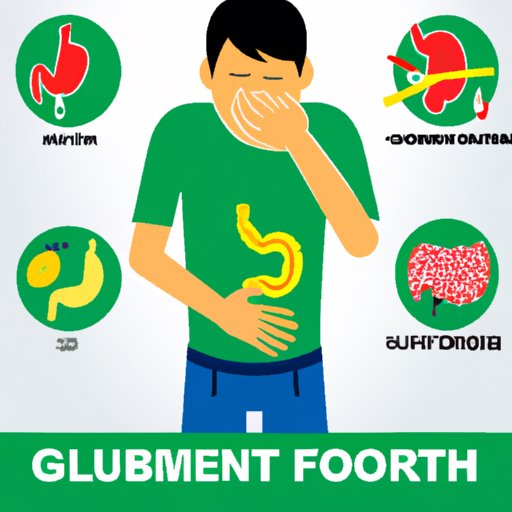Introduction
The stomach flu, also known as viral gastroenteritis, is an infection caused by a number of different viruses. It is highly contagious and can be spread through contact with an infected person, contaminated food or water, or via airborne particles. The virus typically causes inflammation of the stomach and intestines, leading to nausea, vomiting, diarrhea, abdominal pain, headache, and fever.
What Are Common Symptoms of the Stomach Flu?
The most common symptoms of the stomach flu include nausea, vomiting, diarrhea, abdominal cramps, and loss of appetite. Other symptoms may include muscle aches, fever, chills, headaches, and fatigue. The symptoms usually last for one to three days, but can last up to a week in some cases.
When Are You Contagious with the Stomach Flu?
You are most contagious with the stomach flu during the first two days of your illness. However, you can still be contagious up to two weeks after your symptoms have disappeared. During this time, it is important to practice good hygiene and avoid close contact with people who are not already infected.
How Long Does the Stomach Flu Last?
The duration of the stomach flu varies from person to person, but most cases last between one and three days. In some cases, symptoms may last up to a week. It is important to rest and drink plenty of fluids while you are sick to help speed up your recovery.
Advice for Reducing the Spread of Stomach Flu
If you have the stomach flu, it is important to take measures to reduce the risk of spreading the virus to others. This includes washing your hands thoroughly and often, avoiding contact with other people, and staying home until you are feeling better. It is also important to dispose of any items that may have been contaminated with the virus, such as tissues, towels, and bedding.

Prevention Strategies for Stomach Flu
There are several steps you can take to help prevent the spread of the stomach flu. These include washing your hands frequently, avoiding contact with anyone who is sick, and disinfecting surfaces regularly. Additionally, it is important to make sure that food is cooked properly and that fruits and vegetables are washed before eating.

What to Do If You Have the Stomach Flu
If you have the stomach flu, it is important to get plenty of rest and drink plenty of fluids. Over-the-counter medications such as ibuprofen and acetaminophen can help relieve fever and pain. Additionally, you should avoid contact with other people, stay home from work or school, and dispose of any items that may have been contaminated with the virus.

Understanding the Risks of Stomach Flu
Although the stomach flu is usually mild and lasts only a few days, it can be serious in certain cases. People with weakened immune systems, young children, and the elderly are at a higher risk for complications from the virus. If you or someone you know has severe symptoms, it is important to seek medical attention immediately.
Conclusion
The stomach flu is a highly contagious virus that can cause uncomfortable symptoms. It is important to understand when you are contagious with the stomach flu, as well as how to prevent it. By following the advice outlined in this article, you can help reduce the risk of spreading the virus and ensure a speedy recovery.
(Note: Is this article not meeting your expectations? Do you have knowledge or insights to share? Unlock new opportunities and expand your reach by joining our authors team. Click Registration to join us and share your expertise with our readers.)
